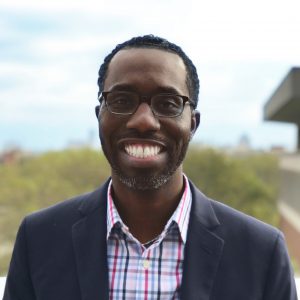
Joseph L. Tucker Edmonds is an Associate Professor of Religious Studies and Africana Studies at Indiana University’s School of Liberal Arts at IUPUI and the Associate Director of the Center for the Study of Religion and American Culture. He earned his Bachelor of Arts in Religious Studies and Economics from Brown University, his Master of Divinity from Union Theological Seminary in New York City, and his PhD in Religious Studies from Duke University.
Professor Tucker Edmonds’ research interests are black and womanist theologies, alternative Christianities in the black Atlantic, and the role of scripture in African and African American religious traditions. Joseph has received grants from the Wabash Center for Teaching and Learning, the Fund for Theological Education, and the Woodrow Wilson Foundation. His most recent scholarship has focused on the relationship between alternative Christian movements and the Black body with a recent article entitled “The Canonical Black Body: Alternative African American Religions and the Disruptive Politics of Sacrality” in the journal Religions. In addition to his focus on African and African American Christian traditions, Tucker Edmonds is a noted teacher and an engaged scholar. He serves as the president of the local Indianapolis branch of the Association for the Study of African American Life and History (ASALH), is a member of the editorial board of the Wabash Center’s Journal on Teaching, and is currently leading a community-engaged project that is studying the impact of COVID-19 on Black arts and cultural institutions in Indianapolis.
Tucker Edmonds’ upcoming book, The Other Black Church: Alternative Christian Movements and the Struggle for Black Freedom, will be published in the fall of 2020. This book highlights the variety and vibrancy of the African American Christian sphere during the latter half of the twentieth century, and it adds to the growing body of work that is addressing alternative Christian traditions, the reorganization of the black public sphere during the twentieth century, and the importance of alternative Christian traditions in shaping the terms of freedom and citizenship in the larger African American community.